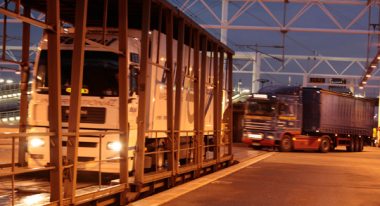An acute UK shortage of medical isotopes was relieved last week by the resumption of frequent shipments through the fire-damaged Channel Tunnel.
 |
| Trucks are loaded on Eurotunnel trains for undersea passage between France and Britain (Image: Eurotunnel) |
Essential diagnostic procedures were being cancelled in UK hospitals last week as supplies of the radioisotope technetium-99m ran critically low. The immediate cause of the shortage was a major fire in the Channel Tunnel which occurred on 11 September, limiting trade between Britain and the European mainland. The problem highlighted worldwide production shortages of molybedenum-99, the parent product of technetium-99m, as well as the lack of options available for shipping radioactive materials.
The fire occurred within one of the two tunnels that underpass the English Channel to connect Britain and France. The south tunnel continues to operate, while a large section of the north tunnel is being repaired. Services through the tunnel were initially cut to less than half, and it is still unable to cope with demand.
The UK Department of Health said that in the early part of this month, supplies of isotopes were at about 50% of normal levels due to a general worldwide shortage. However, the difficult situation was exacerbated when a 22 September shipment of molybdenum-99 from a main production facility in the Netherlands lost its activity because of having to wait several hours to board the Eurotunnel Shuttle. Molybdenum-99 has a half life of just 66 hours.
World Nuclear News has learned that the effect of this failed delivery on UK hospitals in the south of England was particularly acute as it followed the weekend, when shipments do not regularly occur. Subsequent days' deliveries were successful, however, allowing hospitals to resume essential procedures at the previous level.
The tunnel incident has also affected the export of short-lived radioisotopes produced in the UK to the European mainland. According to the UK authorities, vehicles carrying these isotopes had to be provided with a police escort to ensure they boarded the Eurotunnel Shuttle without delay. French police are also ready to escort deliveries, should queues at terminals grow too long.
The Channel Tunnel fire has exacerbated an already difficult situation regarding the worldwide supply of technetium-99m, which emerged when coincidental shutdowns of research reactors and associated plants occurred at the end of August. In particular, the High-Flux Reactor at Petten in the Netherlands is out of action at least until November while engineers respond to an anomaly spotted during a routine check. Separately, a release of iodine-131 from a Belgian isotope processing factory has led to its prolonged shutdown.
Trains and boats and planes
Last week's situation in the UK set in sharp relief the lack of options for carrying radioactive materials when major routes are blocked. The Netherlands is currently one of the UK's main suppliers, but the isotopes cannot be flown directly to the UK as major air carriers on this route will not accept radioactive materials as cargo. The phenomenon known as 'denial of shipments' stems from a variety of factors, including the lack of economic benefit for carriers, the false perception that handlers are subjected to significant doses, and the complex regulatory procedures surrounding the materials.
World Nuclear Association director general John Ritch said: "Corporate and union policies should not be allowed to impede the larger public interest in the broad availability of valuable radioactive materials. Governments need to join forces behind a common international policy that ensures the safe, timely shipment of materials which are vital to modern life."
A Eurotunnel spokesman told WNN that the company was very happy to carry radioactive materials within regulations and to carry them as fast as possible. Currently the only constraints, he said, are limited capacity and the required planning to ensure scheduled shipments are loaded on trains in a timely manner.




_30199.jpg)
_72306.jpg)

_49562.jpg)





